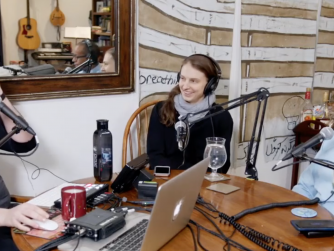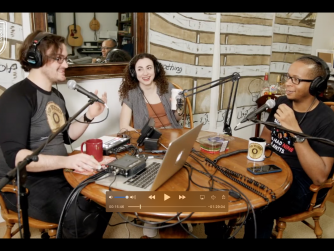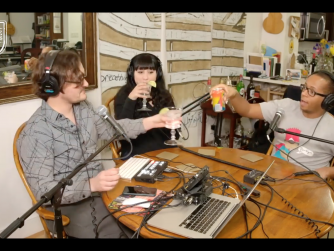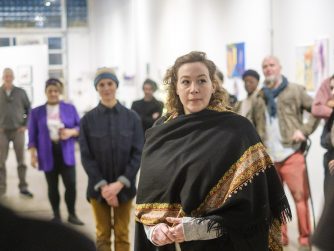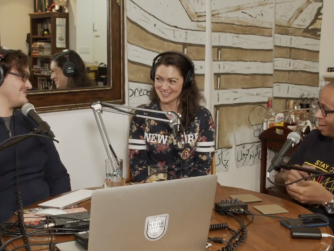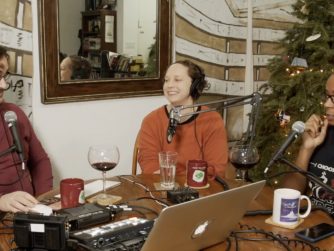This week Daniel and Monty sit down with director, writer, and acting teacher Anya Saffir. Anya taught Daniel and Monty during their undergraduate time in the Atlantic Conservatory program at NYU’s Tisch School of the Arts. Since then, she has directed around the world from Mexico City to the Moscow Art Theatre. To learn more, check out her website anyasaffir.com.
Topics include:
- Anya’s unexpected and life-changing experience teaching and now directing in Mexico City
- What it is about directing the classics that appeals to Anya more than directing new work
- The unique school of philosophy at the University of Wittenberg during Shakespeare’s time
- The power of writing that brings artists and audience members into contact with core human questions (or “the vein of humanity” or “the great mysteries”) without seeking to answer them
- Freud’s concept of “Religiosity”
- Looking at plays that confront you with the big existential questions as their own form of religious texts
- How working on plays that explore the big questions can help artists when they reach those moments in their own lives and leave them a little wiser and a little bit more peaceful
- The debate between Tuzenbach and Vershinin in The Three Sisters on whether humanity moves forward or essentially stays the same as it advances, and what that implies for people who seek happiness in the present moment or sacrifice for future generations.
- Daniel Kemper as the next Teri Gross
- Chekhov’s principle value of Freedom and how that demands a spontaneity and freedom where every moment changes from one performance to another
- How to direct “that which only wants to be free,” or how Anya translated the above struggle into a new type of rehearsal process to rigorously learn the world and then establish an environment for play
- The glory of the traverse (or “tennis court”) audience arrangement
- The power of isolating the human voice and the fear of having to be spontaneous in an age where so much communication can be written and rewritten
- Mirror Neurons and their implications in an age where many people spend more time with technology than other human beings
- The term “Master Teacher”
- The power of putting in the hours
- Confidence as a biproduct of preparing, showing up, and doing the work
- The power of coming into the first rehearsal with the lines already learned deep in your bones
- Flow State, or Optimal Performance State
- The tremendous pressure on directors to “make their mark” and how it often leads to productions that smell of the director’s own ego needs rather than the “necessary question of the play” or the playwright’s intent.
Music is by Kara Arena, Master of Music for Rude Grooms. Follow us @thiswoodeno on Twitter and Instagram, visit us on the web at thiswoodeno.com, like us at facebook.com/thiswoodenopod/, or support us on Patreon (patreon.com/rudegrooms) to join the conversation during livestream broadcasts of every episode.
This week’s shoutouts & further reading include:
- Teatro Helinico: helenico.gob.mx/
- Hamlet by William Shakespeare: amzn.to/39dRIMW
- The Three Sisters by Anton Chekhov: amzn.to/3bjXkqS
- Anna Karenena by Leo Tolstoy: amzn.to/2ve3ZSW
- Uncle Vanya by Anton Chekhov: amzn.to/38bRCW7
- Different Every Night by Mike Alfreds: amzn.to/2vkDpY8
- Shakespeare Dallas: shakespearedallas.org
- Casa Mañana: casamanana.org/
- Sherry Turkle – TED Talk: ted.com/talks/sherry_turkle_connected_but_alone; Reclaiming Conversation (book): amzn.to/2w24wb3
- Oprah Winfrey’s SuperSoul Conversations with Maya Angelou: supersoul.tv/tag/dr-maya-angelou
- Ashley White: ashleyhwhite.com/
- Neutral Chaos Combat: Intimacy in Performance Intensify: neutralchaoscombat.com/visiting-artists-2/
This Wooden O is a production of Rude Grooms. Learn more at rudegrooms.com or follow us @rudegrooms on Twitter, Instagram, and Facebook.



